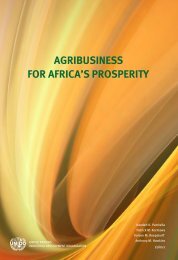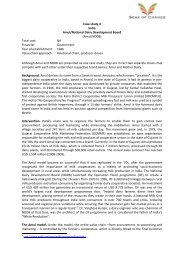Collection of Case Studies 2. - Seas of Change Initiative
Collection of Case Studies 2. - Seas of Change Initiative
Collection of Case Studies 2. - Seas of Change Initiative
Create successful ePaper yourself
Turn your PDF publications into a flip-book with our unique Google optimized e-Paper software.
4. What are the key implications for scaling inclusive business?Key featuresEffective governance. ITC is the chain governor, and decisions are made to benefit its stockholders. However,a win-win situation has been created because farmers also benefit from cost reductions in the chain, without anyobligation for farmers to sell to ITC. The farmer’s purchasing power has also increased through availability <strong>of</strong>cheaper and reliable agricultural inputs sold in the e-Sagaars, along with his/her bargaining power, which hasbeen enhanced through improved access to information.Information flow. Internet kiosks (e-Choupals) located in the villages allow farmers to gain access to informationon weather, crop prices, scientific farming practices, farmer peer groups, soil testing services, trainings; thisenables farmers to improve productivity and make better informed selling decisions. This online information ismade available in Hindi. Furthermore, the recent wide availability <strong>of</strong> televisions in rural villages has provided anextra means for farmers to access valuable information.Trust. Transparency in the products’ analysis, measurement, and weighing (electronic weighing devices), hasenhanced the level <strong>of</strong> trust within the chain. Moreover, farmers’ free access to information from sanchalakswithout compulsion to sell to ITC increases the level <strong>of</strong> trust even further.PPP. This is a private initiative.Provision <strong>of</strong> credit. All transactions are on a cash basis and no credit is involved.Diversification. ITC is primarily dealing with soya beans.Capacity building. Market and weather knowledge is shared, and training is provided in better farm practices,risk mitigation and holistic crop management.Chain efficiency/Competitiveness. Chain efficiency has been achieved through reduction in costs at thefarmers’ as well as at ITC’s (supermarket) level. The chain’s competitiveness has been enhanced by eliminatingUSD 13/ton <strong>of</strong> the costs. These savings are shared between the farmer (USD 6/ton) and ITC (USD 7/ton).Inputs. ITC sells high quality inputs at a lower price, and this has allowed farmers to increase yields.Technology transfer. Technology is transferred at ITC Sagaars and is available to all producers.Market linkages. The initiative provides an alternative market linkage mechanism (previously the only options forfarmers were mandis) at a lower cost.Sustainability. Since ITC is the chain governor, sustainability will be assured for as long as the companycontinues to find this to be a pr<strong>of</strong>itable business.Drawbacks. No specific attention was given to gender equity or to the landless.Sources:• Field mission: ITC Ltd. Agribusiness Division, Bhopal, 7 th June 2008.• Data provided by Dr. Nirmal Reddy, General Manager (Commodities), ITC Ltd - Agribusiness Division.• E-Choupal: ITC’s Rural Networking Project, case study prepared by Pr<strong>of</strong>. Subhash Bhatnagar and Ankita Dewan at theIndian Institute <strong>of</strong> Management (Ahmedabad) and Magui Torres and Parameeta Kanungo at the World Bank.• E-Choupal lauded by the President <strong>of</strong> India, NASC Complex, New Delhi, 5 th June 2007.• E-Choupal <strong>Case</strong> Study from India. Information Technology and Social Enterprise. E-Choupals Use Internet Kiosks toIncrease Food Price Transparency. Jan 2009.• ITC e-Choupal: Corporate Social Responsibility in Rural India, A. Farhoomand, S. Bhatnagar, 2008.• Nurturing entrepreneurship in India’s villages, The McKinsey Quarterly, Nov 2008.• What works: ITC’s e-Choupal and pr<strong>of</strong>itable rural transformation. Web-based information and procurement tools forIndian farmers. University <strong>of</strong> Michigan, K. Annamalai, S. Rao, Aug 2003.• Use <strong>of</strong> ICT in Agri Business: Prospects and Challenges. FAI workshop on importance <strong>of</strong> ICT in the fertiliser andagriculture sectors, May 2006. http://www.faidelhi.org/training%20programme/workshop-Gao-06/Use%20<strong>of</strong>%20ICT%20in%20Agri%20Business%20-%20Sanjiv%20Sharma.pdf7







